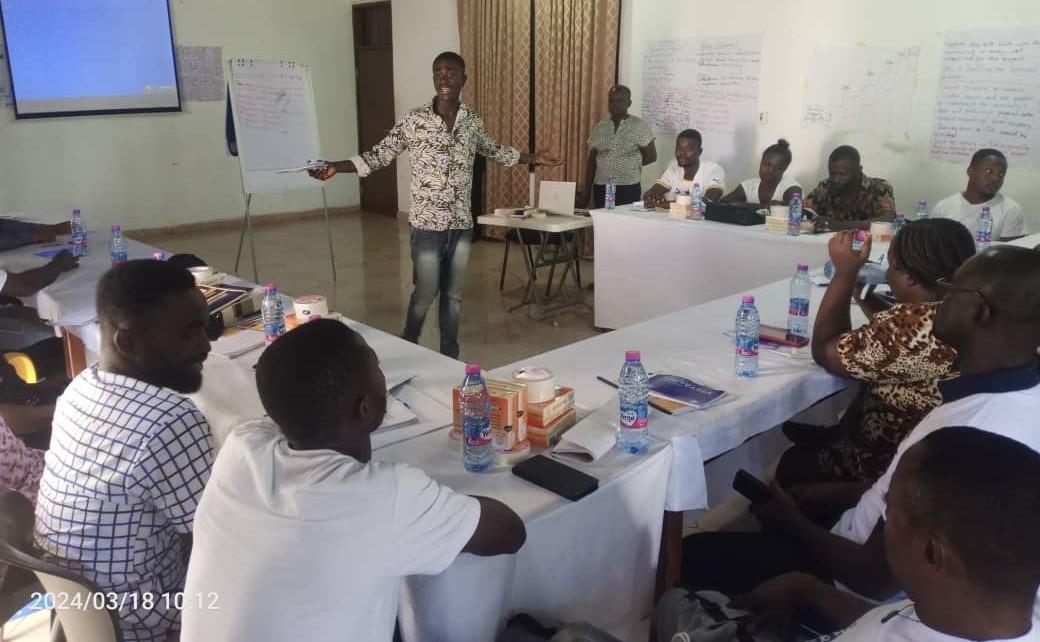Community-Based Facilitators (CBFs) play a lead role in the implementation of the Facilitated Collective Action Process (FCAP), which aims at strengthening local participation in the implementation of the medium-term development plans of some selected district and municipal assemblies in Ghana.
These CBFs are responsible for mobilizing their communities and monitoring projects being implemented under FCAP, otherwise known as “Oman yie die.”
They usually undergo a week-long training prior to the implementation of the FCAP in their respective communities. One of such training programmes has taken place at Nkoranza in the Bono East region for some staff of the Nkoranza South Municipal Assembly and CBFs from Asuano, Barnofour, Abountem, Akuma, Brahoho, Nkwabeng, Akumsa Domase, Bonso and Bredi, all in Nkoranza South as well as Akwabuoso and Ekorso Akwadum in the Atiwa West district of the Eastern region.
The training was organised by the Community-Driven Development (CDD) department of Advocates for Community Alternatives (ACA), a non-profit-making organisation which supports West African communities facing threats to their human rights at the hands of multinational corporations.
There were presentations, focused-group discussions, role-plays and field visits to selected communities which have successfully implemented FCAP, among others. At the end of the training session, some of the participants shared their views about the lessons they had learnt. We bring you excerpts of views shared by some of the participants after the training program in Nkoranza.
Gifty Acheampong, Assistant Planning Officer, Nkoranza South Municipal Assembly
This training has taught me that we can implement projects by paying less when we involve the community members because when they are being involved, they own the project and can support us in so many ways that we cannot even quantify in monetary terms to undertake the project as we want it to look like.
John Tuffuor, Community-Based Facilitator, Akuma, Nkoranza South, Bono East
If for nothing at all, I have learnt to be bold when leading a group of people and as the CBF for my community, this would help me in my daily work. Also, I noticed that community-driven projects undertaken through FCAP is cost-effective as compared to similar projects executed by the government so I will recommend to the government to critically study this concept and replicate it in the various districts. I think government can collaborate with ACA to make this happen. This concept of community development carries the entire community along, with community members assisting with communal labour so it’s helpful.
Kwame Bonsu, Community-Based Facilitator, Baanofour, Nkoranza South, Bono East
Before coming to this training session, I didn’t know how to speak at a gathering. I always found it difficult speak out in public but today I can boldly speak and express myself anywhere I find myself, thanks to this training by ACA. So, for me, that is one of the main benefits I have derived from the training program.
Eric Owusu, Community-Based Facilitator, Akumsa Domase, Nkoranza South, Bono East
Through this training, I have learnt that even as an individual, I should be able to mobilize and organize my community for development. I have learnt how to lead discussions about development initiatives in my community and I’m positive that I’m going to live up to expectation and help push the development of my community forward.
Peter Donkor, Community-Based Facilitator, Bredi No.1, Nkoranza South, Bono East
One thing I have picked up from this training is that there is power in unity. If a community comes together with one accord, there is a lot they can do to turn their fortunes round.
Abraham Ayisa, Community-Based Facilitator, Ekorso Akwadum, Atiwa West district (Eastern Region)
The need to encourage women’s participation in decision-making at the community level was key at the training programme. In view of this, there is the need to deeply involve women in all the discussions about the planning, execution, monitoring and completion of the project.
Felicity Acquah, Community-Based Facilitator, Akwabuoso, Atiwa West district (Eastern Region)
Through this training, I have come to the realization that if the local government authority would allow communities to have a say in project identification and implementation, it would go a long way to galvanize more support and enthusiasm from the people in the process. This will also ensure that the community members will embrace the project and support its execution whole-heartedly.
Prince Kwabena Owusu, Community-Based Facilitator, Nkwabeng, Nkoranza South, Bono East
This training has had enormous benefits in us as participants. First of all, it has instilled in us the spirit of communalism and also engendered networking among people from other communities, which will help us a lot, going forward. I have learnt that once there is unity of purpose among us as a community, devoid of divisive tendencies, we can really achieve a lot.
Benjamin Opoku, Community-Based Facilitator, Brahoho, Nkoranza South, Bono East
ACA has really supported several communities to take control of their futures and I am of the conviction that my community will soon be able to reach that level of development when we also start the implementation of FCAP.
Seth Owusu Boadi, Unit Head, Community Development, Nkoranza South Municipal Assembly
This training reminds me of a quote by Ghana’s first president, Dr. Kwame Nkrumah, that: “The black man is capable of managing his own affairs.” What this this means to us is that the communities can take their destinies into their own hands, have a common vision and pursue it to their own benefit without necessarily waiting for the government. One lesson here is that, when the community initiates and leads in the implementation of a project, that project becomes very successful and very useful.

Recent Comments